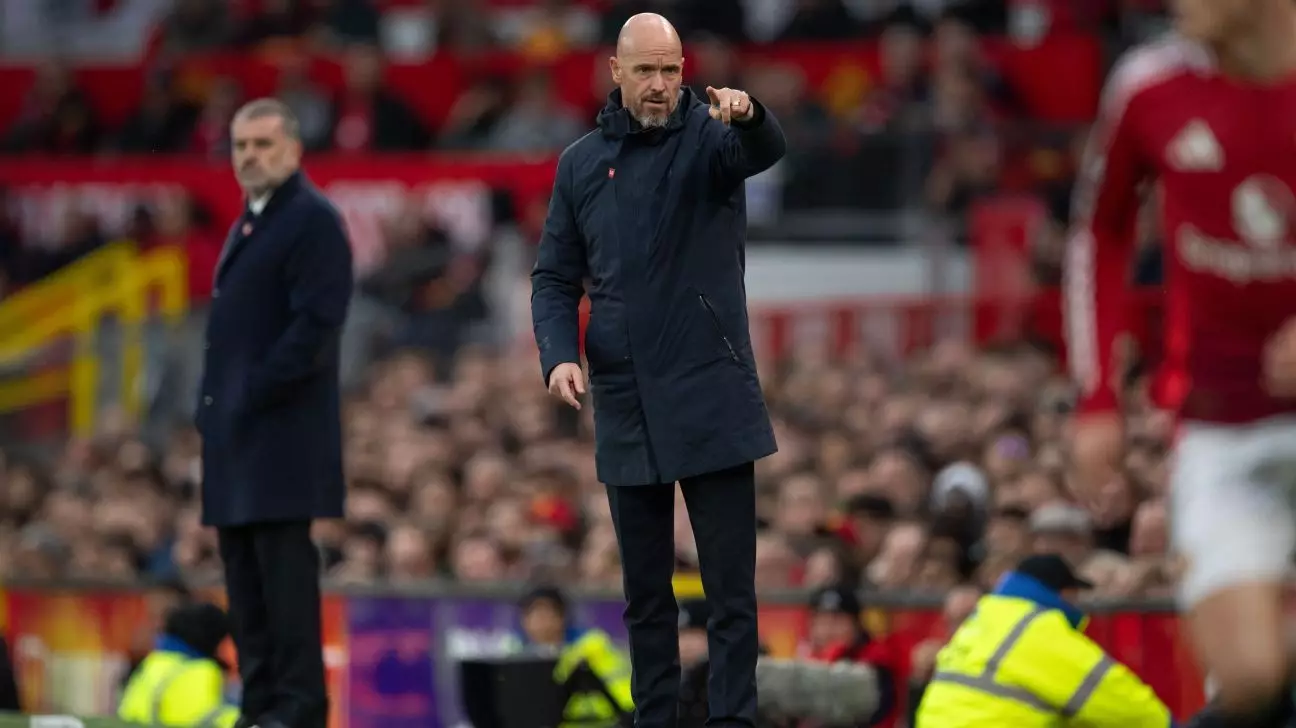It is a widely recognized truth in football that the psychology surrounding game outcomes often influences subsequent performances. In the wake of Manchester United’s disheartening 3-0 home defeat against Tottenham Hotspur, manager Erik ten Hag’s comments reflect both an effort to maintain morale and a dismissal of potentially detrimental narratives. The red card issued to captain Bruno Fernandes was pivotal in this encounter, turning the tide against a struggling United side, yet was subsequently rescinded. This decision serves as a crucial aspect in Ten Hag’s rationale for categorically dismissing the relevance of the defeat.
On September 29, Spurs showcased their dominance with goals from Brennan Johnson, Dejan Kulusevski, and Dominic Solanke. Despite the game being a tough loss for United, Ten Hag’s immediate focus post-match was not on the scoreline but on the controversial officiating decision that he believed unfairly impacted the overall outcome. By stating that he chose to “deny” and “ignore” the game, Ten Hag seeks to shift the narrative from one of failure to a focus on resilience and determination within his squad.
Ten Hag’s emphasis on resilience and fighting spirit serves not only as a response to criticism but also as a rallying cry for his team. Following the Tottenham game, he was keen to highlight the positive attributes he perceives in his players, particularly after a challenging draw against Fenerbahce in a subsequent match. “This team is resilient, this team is determined,” he asserted, showcasing his belief in the capability of his squad to rebound from adverse situations.
The acknowledgment of the team’s character is significant; it underscores a coach’s responsibility to inspire confidence in both players and supporters during challenging times. By framing his remarks around a determination to overcome obstacles, Ten Hag creates an environment of unity and hope, which is pivotal as the team navigates early-season turbulence.
A major factor cited for Manchester United’s inconsistencies this season has been a spate of injuries affecting key players, including defenders Luke Shaw, Tyrell Malacia, and midfielder Mason Mount. Ten Hag emphasized the negative ramifications of not having a complete squad available, stating, “When you don’t have the players available, you can’t line up the best team.” His candid acknowledgment of this issue reflects a realistic perspective on the challenges faced in player selection and tactical execution.
The inability to field a full-strength squad has become a significant hurdle not just for results on the pitch but in building cohesive strategies that define a competitive team. Ten Hag’s recognition of the collective responsibilities—encompassing the players and coaching staff for creating a more robust squad—indicates a collaborative approach towards resolving the current limitations. His call for unity in striving for better player availability signifies that he is not merely placing blame but instead aiming for constructive progress.
Looking Forward: Challenges and Opportunities
As Manchester United prepares for their upcoming clash against West Ham, the task at hand is more than just securing points; it’s about rebuilding confidence within the group. Ten Hag’s statements reflect a need to galvanize the squad and maintain focus, ensuring that the squad does not become mired in negativity stemming from prior performances. The narrative moving forward must balance between recognizing the present struggles while instilling hope for improvement.
The manager’s insistence on disregarding the Tottenham loss serves not only to shield his players from undue pressure but also to recalibrate their mindset to focus on future opportunities rather than past disappointments. When assessed holistically, Ten Hag’s approach exemplifies the dual challenges of managing team morale and tackling practical issues such as injuries. His leadership will be tested in the coming weeks, and how well the team responds to his guidance will ultimately shape their season.
As Manchester United ventures further into the competitive landscape, Erik ten Hag stands at a pivotal moment where resilience, character, and strategic focus will define their journey. The resilience showcased during tough times may very well lead to success if appropriately harnessed and maintained.

